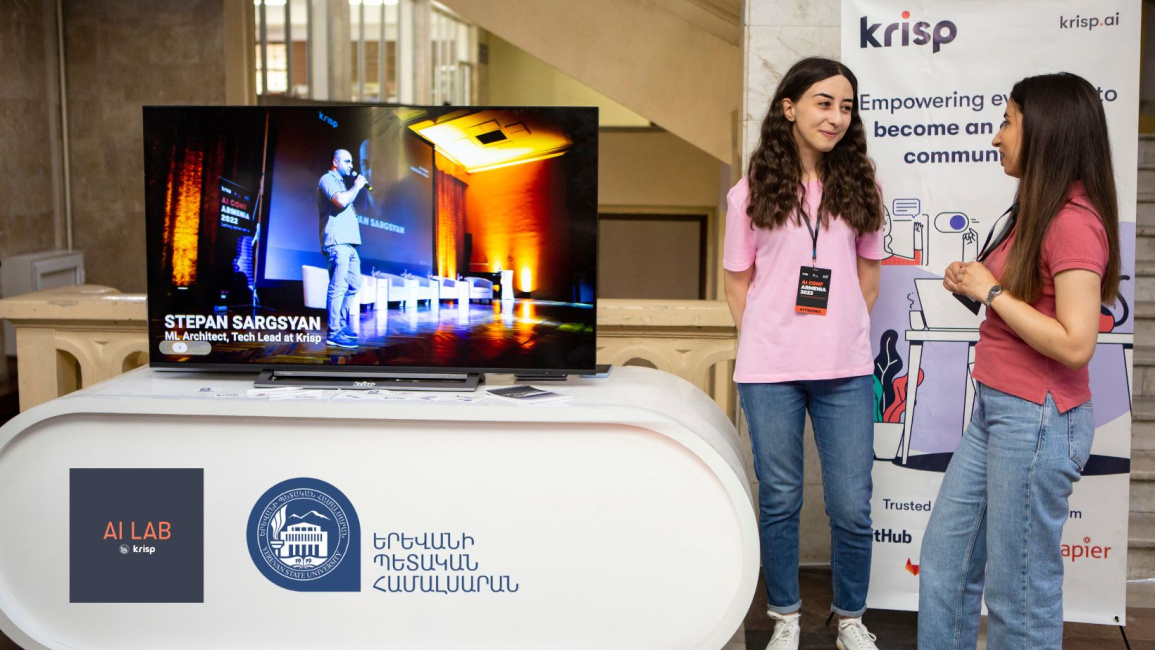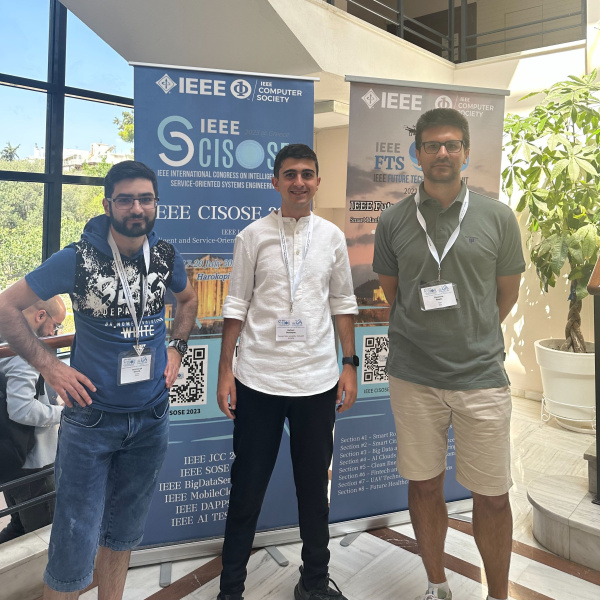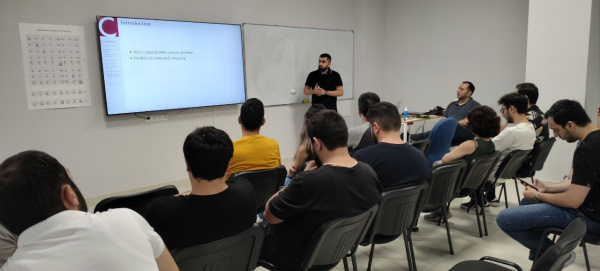January 16, 2024 | 16:03
Science
Research centers and institutes
Research
The development of artificial intelligence is on the YSU agenda
Yerevan State University moves with the times and provides high-quality education, practically ensuring the solution of the problems defined by the strategic development plan. In this article, we have referred to the project implemented by the university in the field of artificial intelligence – YSU-Krisp AI Lab founded with joint efforts of the university and "Krisp" company, as well as the activities, achievements and future plans of the laboratory.

The newly opened YSU Machine Learning or Artificial Intelligence Laboratory started its activity in the second half of 2022. The laboratory has designed its research agenda planning to work on some problems of technological nature, as well as develop theoretical and algorithmic aspects of machine learning.
Achievements as the best result of the laboratory's activities: During its activity, the laboratory became a participant of the "ARMDOCT" YSU pilot program by setting up the building of a new model (industrial) of doctoral school. This school and the new quality postgraduate education will be of great importance from the point of view of the future of the academic environment of the field.
In the same year, in cooperation with partners representing international and RA organizations, a number of works were carried out, recording achievements, based on which laboratory researchers presented reports at two international conferences.
In the second year of operation, the YSU Machine Learning Laboratory continued to design and expand its scientific agenda and cooperation frameworks with a number of studies of the applied significance of machine learning, as well as new developments related to the current problems of artificial intelligence. In particular, with the approaches proposed in the articles, the possibilities of automating some tasks in the management of cloud infrastructures and applications have been substantiated by building explainable models, which, in most cases, is a requirement for the implementation of the automation process. The works are related to the problem of identifying the causes of failures or unwanted behavior in these complex systems; in one case, through measurements expressed in time series, in the other, based on the analysis of application trace data.
Within the framework of the grant program of the Higher Education and Science Committee of RA MoESCS, a new scientific team named the Internet of Things ML was formed in order to solve some applied problems. The scientific group performed works in two directions. Based on the "WAIR-D" database released by the "Huawei" company, a machine learning algorithm was developed, which locates the object based on the radiocommunication parameters with a high-precision antenna.

It should be noted that this work was published in the proceedings of the "IEEE BigDataService 2023" conference. Two members of the group participated in the conference and presented the results. An extended version of the work with more efficient algorithms has been sent to "IEEE Journal on Selected Areas in Communications" scientific journal for publication and is under review.
Working in the second direction, a prototype of the soil monitoring system in the apple orchard was developed, which was presented at the "IEEE DCOSS-IoT 2023" scientific conference. Within the framework of the grant, a system for studying soil parameters was received, which is in the installation process.
The first steps have been taken to establish collaboration with Professor Luca De Nardis from the Sapienza University of Rome and Professor Axel Sikora from the Offenburg University of Applied Sciences. The head of the group, Hrant Khachatryan, presented the activities of the first year of the group at the Pan-Armenian conference.
The cooperation as a key to ensuring the continuity of the laboratory's activities: Now, a new research project has been launched in the laboratory in cooperation with AUA and the University of Santiago under the "FAST Advance" grant program. Nine specialists, including six young researchers, are involved in the studies of the above-mentioned project. Over three years, the team will work based on Dempster–Shafer theory (DST) to form new approaches to building explainable models in machine learning main problems and to test relevant algorithms.
The perspective of the industrial postgraduate program was designed under the contract signed with "Krisp" company. The program will provide postgraduate students with the opportunity to be involved in the works carried out in the direction of current problems arising from technological requirements and finding solutions to them, having material-technical and expert assistance of the given company. It is extremely important in terms of ensuring the formation and evolution of an internationally competitive ecosystem in the sector.

Laboratory activities for the benefit of educational process efficiency: Paying attention to the formation of scientific topics, environment and work models, supervision of postgraduate thesis and graduate papers by the senior researchers of the laboratory (collaborating, in particular, with the Faculties of Applied Statistics and Data Science, Mathematics and Mechanics), work in examination commissions serve for the benefit of the current programs.
Since the establishment of the laboratory, scientific seminars have been organized many times, invited specialists representing different countries and organizations have given lectures. Students, specialists of machine learning and related fields, as well as representatives of various technology companies participated in such meetings. During the previous year, 171 seminar discussions were held in the laboratory auditorium together with a number of partner organizations. This activity effectively contributes to the improvement of the educational environment.
Strategic plan objectives as a guideline: To keep up with rapidly developing world of science and technology, primary objectives must be constantly set. The core objective among them is the development of scientific products, thanks to which the research center will join the ranks of leading scientific centers and teams. It must be emphasized that any success implies a continuous investment of abilities and efforts.
The long-term goal of The Internet of Things ML Group is to become one of the world's leading groups in this field. The works aimed at that goal will also be expressed by the scientific results presented by the group at the thematic conferences. One of the biggest obstacles to the development of this field is the lack of databases. The group will become a center creating such databases, as well as a center of experts getting the most out of any large-scale database using state-of-the-art machine learning tools. To achieve the first goal, a small soil monitoring with IoT has already been acquired in 2023, which will allow large-scale data collection starting this year. And the GPU supercomputer will greatly contribute to the achievement of the second goal, which will provide ample opportunities to perform work in the field of artificial intelligence.
The strengthening of international relations, the formation of a stable staff provided with appropriate resources and the implementation of postgraduate theses will provide an opportunity to strengthen the scientific environment of this new research institution. On the way to achievements, these are the necessary means that are always at the core of the center's activity.

